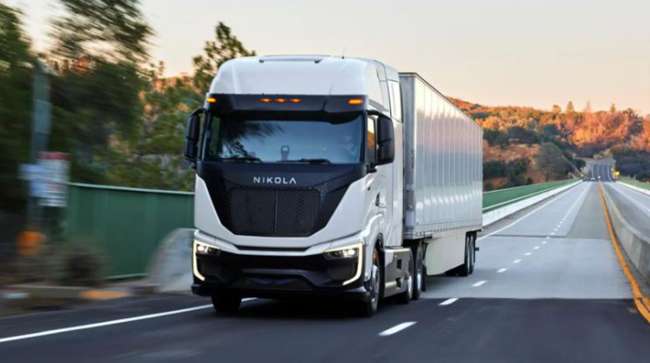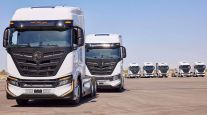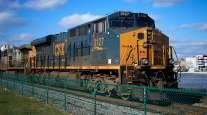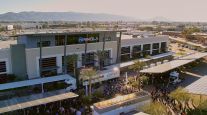Staff Reporter
Nikola Q1 Loss Narrows; Cost of Truck Production Soars

[Stay on top of transportation news: Get TTNews in your inbox.]
Losses at Nikola Corp. in the first quarter of 2024 narrowed year-over-year, and executives are more bullish than in previous quarters about the truck maker’s prospects even as production costs soar.
Phoenix-based Nikola posted a Q1 loss of $147.72 million, down 12.6% compared with $169.094 million in the year-ago period. The Q1 loss also was lower than the Q4 2023 loss of $153.6 million.
However, the company posted a Q1 operating loss of $145.36 million, up 14.3% compared with $127.2 million a year earlier, as it continues to build far fewer trucks than its Coolidge, Ariz., manufacturing facility has the capacity for — with the cost per truck soaring. Nikola said its truck sales costs nearly doubled to $61.75 million in Q1 from $33 million a year earlier. The company built 43 trucks in Q1, compared with 63 in the 2023 period.
That said, the company delivered 40 Nikola Tre hydrogen fuel cell electric vehicles (FCEVs) to end-customers in Q1, exceeding the high end of prior guidance as it previously expected to deliver between 30 and 35 trucks during the quarter. Serial production of the truck began July 31.
Nikola expects its 2024 FCEV truck deliveries to be in a range of 300 to 350 this year, unchanged from the Q4 2023 earnings forecast, executives said.

Okray
Efforts to ramp up production at Coolidge after a May 2023 shutdown and retooling continue, but so do attempts to expand the geographic focus of Nikola’s sales, particularly with costs and cash burn remaining elevated.
Newly appointed chief financial officer Thomas Okray, hired March 4, told analysts May 7 that Nikola would widen its sales focus to states outside of California as well as larger national carrier accounts.
“Absent meaningful volume, our profitability will be below our expectations,” said Okray, who formerly has worked for General Motors, Eaton Corp. and Advance Auto Parts.
While Nikola has previously passed on larger national accounts due to pricing concerns, Okray said the company now is chasing those large fleets to build its order book and cut manufacturing costs through scale. Okray acknowledged the company has left business on the table by not catering to national fleets.
Today, another milestone was achieved in Coolidge, AZ! Check out the 100th production Nikola hydrogen fuel cell electric truck officially coming off the line this afternoon at our manufacturing facility. Thank you to our incredible team for making this milestone possible!… pic.twitter.com/mBEpVcfIA3 — Nikola Corporation (@nikolamotor) April 30, 2024
“We need volume. We need to have Nikola trucks running around the road and delivering freight. And once that starts to happen in great numbers, great things will happen,” he said.
“We’re confident that once we get the big national accounts, there will be what [CEO] Steve Girsky] called the ‘fear of missing out’ with the not-as-big national accounts, who see the bigger ones doing this and want to get in on the game,” said Okray.
National accounts are classified by Nikola as carriers with more than 1,000 tractors, which Okray said represents at least 250 potential customers. “It’s a meaningful number of customers to go after and delight,” he said.
Nikola expands hydrogen network with inauguration of second HYLA refueling station in southern California. Read about today's news here: https://t.co/Xef4J326Uz — Nikola Corporation (@nikolamotor) May 8, 2024
To service larger accounts, Nikola is speeding the buildout of its Hyla refueling network. Previously, the company said nine stations would be in place in California by the end of 2024. It now expects to provide nine hydrogen fueling points by midyear 2024 and 14 by year-end.
“Going to these national accounts you need that fuel in place — otherwise that discussion doesn’t go as smoothly as you want it to,” said Okray, when asked by an analyst why Nikola was investing resources and capital on the Hyla ecosystem.
“Remember, we’re juggling three balls — we got customers, we got trucks, and we got fuel,” said Girsky. “And at any one time, one of those balls is ahead and one of those balls is behind. Fuel has been behind, and we’re trying to move fuel [from] being a quarter or two behind to being a quarter or two ahead. Not too far, because we don’t want stranded capital out there, but we need it to be ahead. So, we are dropping more fueling locations in place.”
While Nikola’s hydrogen refueling infrastructure expands to support new FCEV customers, owners of the company’s recalled battery-electric models may have to wait longer for the return of their trucks.
Nikola in August recalled all battery-electric Tre semis built or in testing to fix faulty battery packs produced by the company’s one-time subsidiary Romeo Power. During the company’s Q4 2023 earnings call, Girsky said Nikola intended to return all revamped BETs to customers by late Q2 or early Q3 of this year. However, Nikola now expects to complete return by year-end. The company returned the first of the 209 trucks recalled to its owner in Q1, it added.
In addition, Nikola’s plans to deliver 100 new BETs to customers in 2024 are becoming less likely, it said, citing battery supply problems.
“We now expect to opportunistically sell on-hand inventory for revenue in 2025,”the company said.
Want more news? Listen to today's daily briefing below or go here for more info:




